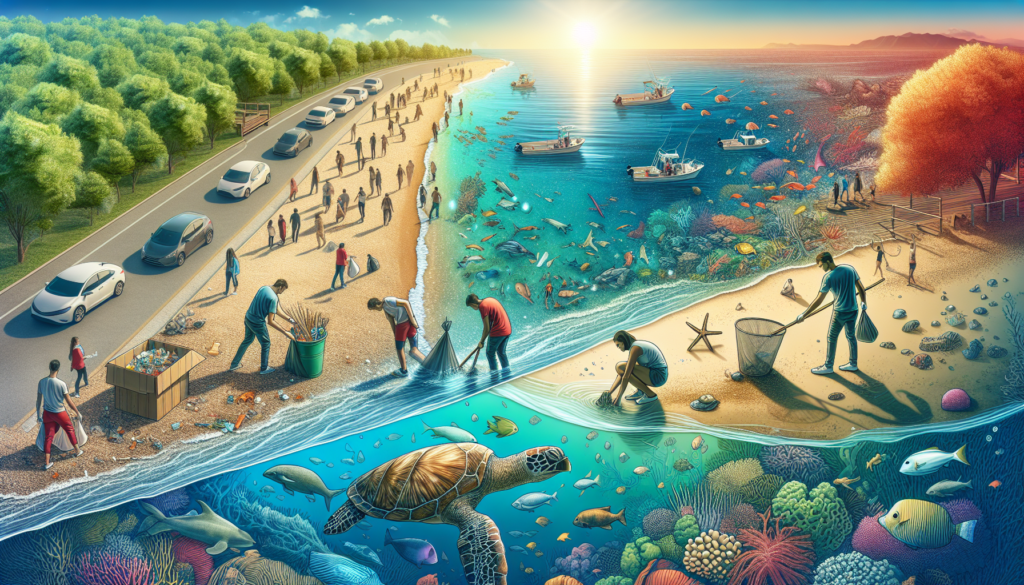Exploring Marine Conservation Tips: Protecting Our Oceans for Future Generations
Our oceans are invaluable ecosystems that support a vast array of marine life and provide numerous benefits to humanity. However, due to human activities such as overfishing, pollution, and climate change, our oceans are facing unprecedented threats. Marine conservation is crucial to safeguarding the health of our oceans and preserving biodiversity for future generations. In this article, we will delve into effective marine conservation tips that can help individuals, communities, and governments play a role in protecting our oceans.
The Importance of Marine Conservation
Marine conservation is essential for maintaining the delicate balance of marine ecosystems and ensuring the sustainability of marine resources. Oceans cover over 70% of the Earth’s surface and play a vital role in regulating the planet’s climate, providing food and livelihoods for millions of people, and supporting a diverse range of marine species. However, human activities such as overfishing, habitat destruction, pollution, and climate change are threatening the health of our oceans and jeopardizing the livelihoods of coastal communities.
By implementing effective marine conservation strategies, we can protect fragile marine ecosystems, restore degraded habitats, and promote sustainable fishing practices. Marine conservation also plays a crucial role in mitigating the impacts of climate change, preserving biodiversity, and ensuring the long-term health of our oceans.
Reduce Plastic Pollution
Plastic pollution is one of the most significant threats to marine ecosystems, with millions of tons of plastic entering the oceans every year. Plastic waste can harm marine life through ingestion and entanglement, disrupt marine food chains, and degrade marine habitats. To reduce plastic pollution, individuals can take simple steps such as reducing the use of single-use plastics, recycling plastic waste, and participating in beach clean-up activities.
Governments and businesses can also play a crucial role in addressing plastic pollution by implementing policies to reduce plastic production, promote recycling, and support the development of biodegradable alternatives. By working together to tackle plastic pollution, we can protect marine ecosystems and ensure the health of our oceans for future generations.
Support Sustainable Fishing Practices
Overfishing is a significant threat to marine biodiversity, with many fish stocks being depleted due to unsustainable fishing practices. To promote sustainable fishing, individuals can choose to consume sustainably sourced seafood, support local fisheries, and advocate for responsible fishing practices. By making informed choices about the seafood we consume, we can help reduce the pressure on overexploited fish stocks and promote the long-term sustainability of marine resources.
Government regulations and international agreements are also essential for addressing overfishing and ensuring the sustainable management of marine fisheries. By enforcing catch limits, implementing marine protected areas, and monitoring fishing activities, governments can help safeguard marine biodiversity and promote the resilience of marine ecosystems.
Protect Marine Habitats
Marine habitats such as coral reefs, mangroves, and seagrass meadows are vital ecosystems that support a diverse range of marine species. However, these habitats are under threat from human activities such as coastal development, pollution, and climate change. To protect marine habitats, individuals can support conservation efforts, participate in restoration projects, and raise awareness about the importance of these ecosystems.
Marine protected areas are valuable tools for conserving marine habitats and safeguarding biodiversity. By establishing protected areas where fishing and other extractive activities are limited, governments can help preserve critical habitats and promote the recovery of marine species. Collaborative efforts between governments, NGOs, and local communities are essential for effectively managing marine protected areas and ensuring the long-term conservation of marine habitats.
Address Climate Change
Climate change is a global challenge that is having profound impacts on marine ecosystems, including ocean acidification, coral bleaching, and sea-level rise. To address climate change, individuals can reduce their carbon footprint by conserving energy, using public transportation, and supporting renewable energy sources. By taking steps to reduce greenhouse gas emissions, we can help mitigate the impacts of climate change on marine ecosystems and promote the resilience of marine species.
International cooperation is crucial for addressing the root causes of climate change and implementing effective mitigation strategies. By supporting international agreements such as the Paris Agreement and working together to reduce emissions, countries can help protect marine ecosystems and ensure the long-term health of our oceans.
Engage in Marine Conservation Education and Outreach
Education and outreach are essential components of marine conservation, as they help raise awareness about the importance of marine ecosystems and empower individuals to take action. By engaging in marine conservation education programs, volunteering for marine conservation organizations, and participating in citizen science projects, individuals can contribute to the protection of marine biodiversity and the sustainable management of marine resources.
Community engagement is also crucial for promoting marine conservation and fostering a culture of stewardship towards our oceans. By working together to address local marine conservation challenges, communities can help protect marine habitats, support sustainable fishing practices, and advocate for policies that safeguard marine biodiversity.
Conclusion
Marine conservation is a critical endeavor that requires collective action and a commitment to protecting our oceans for future generations. By implementing effective marine conservation tips such as reducing plastic pollution, supporting sustainable fishing practices, protecting marine habitats, addressing climate change, and engaging in education and outreach, we can help safeguard the health of our oceans and promote the resilience of marine ecosystems.
It is essential for individuals, communities, governments, and businesses to work together to address the threats facing our oceans and ensure the sustainability of marine resources. Through concerted efforts and a shared commitment to marine conservation, we can preserve the beauty and biodiversity of our oceans for generations to come.



